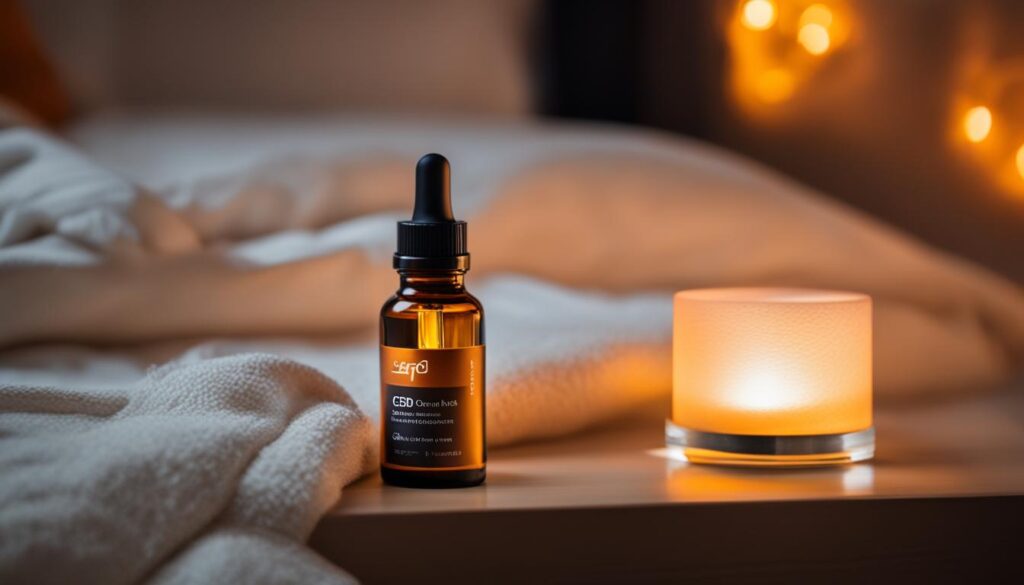Exploring the Connection Between CBD and Sleep: Key Insights
When it comes to getting a good night's sleep, many people turn to natural remedies to help them drift off into dreamland. One such remedy that has gained significant attention in recent years is CBD, or cannabidiol. Derived from the cannabis sativa plant, CBD has shown promise in indirectly benefiting sleep by addressing various underlying factors that can disrupt our rest.
Studies have indicated that CBD may have a positive impact on sleep disorders such as insomnia and restless leg syndrome. Additionally, it can also help alleviate conditions that negatively affect sleep, such as anxiety and chronic pain. By easing anxiety and reducing pain, CBD can help individuals relax, which is essential for falling and staying asleep.
As we dive deeper into the connection between CBD and sleep, let's explore its role in treating insomnia, its impact on circadian rhythm disorders, its effects on anxiety, as well as its potential benefits in managing restless leg syndrome and chronic pain. We'll also take a closer look at the role of endocannabinoids in sleep regulation and the molecular mechanisms behind CBD's effects on sleep.
Key Takeaways:
- CBD, derived from the cannabis sativa plant, may indirectly benefit sleep by addressing underlying factors that disrupt rest.
- Studies suggest that CBD can help treat sleep disorders such as insomnia and restless leg syndrome.
- CBD's potential benefits for sleep improvement include reducing anxiety, alleviating pain, and regulating stress.
- CBD shows promise in managing conditions that negatively impact sleep, such as anxiety and chronic pain.
- Further research is needed to better understand the mechanisms of action and optimal use of CBD for sleep improvement.
Understanding the Role of CBD in Insomnia Treatment
Insomnia, a common sleep disorder affecting millions of people, can be debilitating and have a significant impact on overall well-being. As researchers delve deeper into the potential benefits of CBD, there is growing interest in its role in insomnia treatment. CBD, or cannabidiol, is a non-psychoactive compound found in cannabis plants, and it has shown promise in promoting better sleep.
One of the ways CBD may help improve sleep quality is by influencing the hypothalamus, a region of the brain responsible for regulating sleep patterns. Studies have suggested that CBD can regulate stress levels and balance the sleep-wake rhythm by interacting with hormones associated with insomnia. In fact, a study comparing CBD and THC found that CBD was more effective in reducing symptoms of insomnia. By ensuring the normal progression of sleep stages, CBD has the potential to enhance both the quantity and quality of sleep.
Furthermore, CBD's indirect effects on sleep can be attributed to its ability to ease anxiety and alleviate pain, which are common barriers to falling and staying asleep. By acting on the endocannabinoid receptors in the limbic system, CBD can help calm intrusive thoughts and restore hormone balance, promoting relaxation and facilitating sleep. Unlike some sleep aids, CBD does not cause drowsiness, making it a suitable option for individuals who experience anxiety-related sleep disturbances.
The Potential Benefits of CBD in Insomnia Treatment:
- Regulates stress levels and equalizes the sleep-wake rhythm
- Reduces symptoms of insomnia more effectively than THC
- Eases anxiety and promotes relaxation
- Alleviates pain, improving sleep quality
CBD's potential as a sleep aid extends beyond insomnia. In the following sections, we will explore its impact on circadian rhythm disorders, anxiety-related sleep disturbances, restless leg syndrome, and chronic pain management. By understanding the various ways CBD can influence sleep, we can gain insights into its potential therapeutic uses and the challenges that may arise.
Sleep Disorders and CBD Treatment
When it comes to treating sleep disorders, CBD has emerged as a potential therapeutic option. The interaction between CBD and the endocannabinoid system in the body offers a promising avenue for improving sleep quality and addressing sleep-wake cycle disturbances. Research in this area is still ongoing, but early findings suggest that CBD may be beneficial for individuals struggling with sleep disorders.
A study published in the Journal of Clinical Psychology found that CBD was effective in reducing anxiety and improving sleep in individuals with insomnia. CBD's ability to regulate stress and calm intrusive thoughts can help promote a sense of relaxation, making it easier to fall asleep and stay asleep throughout the night. Additionally, CBD's anti-inflammatory properties may contribute to pain reduction, which is often a common impediment to quality sleep.
To better understand the potential benefits of CBD for sleep improvement, it is crucial to conduct more controlled clinical trials. These studies can help establish the optimal dosage, long-term effects, and potential interactions with other sleep aids or medications. With further research, CBD may become a valuable tool in managing sleep disorders and improving overall sleep quality for those in need.

CBD’s Effects on Anxiety and Sleep
Research suggests that CBD may have beneficial effects on anxiety and sleep. By acting on the endocannabinoid receptors in the limbic system, CBD can help calm intrusive thoughts and restore hormone balance, which in turn can facilitate sleep. Unlike traditional anxiety medications, CBD does not cause drowsiness, making it an ideal tool for individuals who experience anxiety-related sleep disturbances.
In a study published in the Journal of Clinical Psychology, researchers found that CBD reduced anxiety in individuals with social anxiety disorder. Participants reported improved sleep quality and reduced insomnia symptoms after taking CBD. Another study conducted on patients with post-traumatic stress disorder (PTSD) found that CBD significantly reduced anxiety and improved sleep scores.
While the exact mechanisms by which CBD affects anxiety and sleep are still being investigated, early findings indicate its potential as a natural remedy for sleep disorders associated with anxiety. However, it is important to note that CBD's effects may vary among individuals, and further research is needed to determine optimal dosage and long-term effects.
“CBD reduced anxiety in individuals with social anxiety disorder. Participants reported improved sleep quality and reduced insomnia symptoms after taking CBD.”
Can CBD Help with Insomnia?
Insomnia is a common sleep disorder characterized by difficulties falling asleep or staying asleep. CBD has shown promise as a potential treatment for insomnia due to its calming effects and ability to regulate stress. By interacting with the endocannabinoid system, CBD can promote relaxation and help individuals achieve a more restful night's sleep.
In a study published in the journal Medicines, researchers investigated the effects of CBD on sleep and anxiety in a clinical population. The study found that CBD significantly improved sleep scores and reduced anxiety symptoms in the majority of participants. CBD's ability to address both anxiety and sleep disturbances makes it a promising option for individuals struggling with insomnia.
While CBD may offer potential benefits for sleep improvement, it is important to consult with a healthcare professional before incorporating CBD into your sleep routine. They can provide guidance on dosage, potential interactions with other medications, and help monitor your progress.
The Role of Sleep Research in Understanding CBD’s Effects
Scientific research plays a crucial role in understanding the relationship between CBD and sleep. Sleep studies help researchers evaluate the efficacy of CBD in treating various sleep disorders and provide insights into the underlying mechanisms of action.
Studies have shown that CBD's effects on sleep are complex and may involve interaction with multiple biological pathways. These include the endocannabinoid system, which regulates sleep homeostasis, and the serotonin system, which influences mood and sleep-wake cycles. By investigating these mechanisms, researchers can develop a better understanding of how CBD impacts sleep and identify potential therapeutic applications.
However, it is important to note that research in this field is still in its early stages, and more studies are needed to establish definitive conclusions about CBD's effects on sleep. Ongoing research endeavors will continue to provide valuable insights into the potential benefits and limitations of CBD as a sleep aid.
CBD and Restless Leg Syndrome
Restless Leg Syndrome (RLS) is a neurological condition that can disrupt sleep due to involuntary muscle twitching. CBD shows promise in reducing the frequency of abnormal nerve firings that cause these muscle movements. Although more research is needed to confirm CBD's efficacy as an RLS treatment, early findings based on patient experiences suggest its potential benefit.
RLS is characterized by uncomfortable sensations in the legs, often described as crawling, tingling, or itching sensations. These sensations can worsen at night, leading to difficulty falling asleep or staying asleep. The motor symptoms of RLS, such as limb movements and jerking, can further disrupt sleep and contribute to daytime fatigue.
CBD, with its potential anti-inflammatory and analgesic properties, may help alleviate the symptoms of RLS and improve sleep quality. By interacting with the body's endocannabinoid system, CBD can modulate the activity of neurotransmitters and reduce the abnormal firing of nerves that contribute to RLS symptoms. Additionally, CBD's anxiolytic effects may help reduce any anxiety or stress associated with RLS, further promoting better sleep.
| Pros of CBD for Restless Leg Syndrome | Cons of CBD for Restless Leg Syndrome |
|---|---|
|
|
Key Takeaways:
- CBD shows promise in reducing the frequency of abnormal nerve firings that cause muscle twitching in Restless Leg Syndrome.
- Early findings based on patient experiences suggest that CBD may be beneficial for managing RLS symptoms and improving sleep quality.
- More research is needed to fully understand the efficacy of CBD for RLS and its potential interaction with other medications.
CBD for Managing Chronic Pain and Improving Sleep
Chronic pain can significantly impact sleep quality, making it difficult to fall asleep and stay asleep throughout the night. Fortunately, CBD has emerged as a potential solution for managing chronic pain and improving sleep. By targeting pain receptors and reducing inflammation, CBD can alleviate pain and promote relaxation, ultimately contributing to better sleep.
A study published in the Journal of Clinical Medicine found that CBD significantly reduced chronic pain and improved sleep quality in patients with conditions such as fibromyalgia and multiple sclerosis. Participants reported decreased pain levels, increased sleep duration, and enhanced overall sleep satisfaction. The analgesic properties of CBD make it a promising alternative to traditional pain medications, which often come with side effects and the risk of addiction.
“CBD has greatly improved my sleep quality and relieved my chronic pain. I no longer wake up multiple times during the night due to discomfort, and I wake up feeling more refreshed and well-rested,” shared Sarah, a chronic pain sufferer.
When using CBD for managing chronic pain and improving sleep, it's important to note that everyone's response may vary. Finding the right dosage and delivery method (such as CBD oil, capsules, or topicals) is crucial for optimal results. Consulting with a healthcare professional experienced in CBD usage can help determine the appropriate approach for individual needs.
Table: CBD Products for Chronic Pain and Sleep Improvement
| Product | Description | Benefits |
|---|---|---|
| CBD Oil | Sublingual oil that is absorbed directly into the bloodstream. | Fast-acting relief, customizable dosage, and wide availability. |
| CBD Topicals | Topical creams, lotions, or balms infused with CBD. | Localized pain relief, soothing effect on muscles and joints. |
| CBD Capsules | Oral capsules containing measured CBD dosage. | Convenient, consistent dosage, easy to incorporate into a daily routine. |
While CBD holds promise for managing chronic pain and improving sleep, it's important to note that more research is needed to fully understand its long-term effects and optimal usage. Additionally, individuals are advised to purchase CBD products from reputable sources that provide third-party lab test results to ensure product quality and potency. With further exploration and scientific advancements, CBD has the potential to revolutionize chronic pain management and promote healthier sleep patterns.
The Role of Endocannabinoids in Sleep Regulation
When it comes to understanding the effects of CBD on sleep, it is essential to explore the role of endocannabinoids in sleep regulation. Endocannabinoids, the natural cannabinoids produced by the body, play a significant role in modulating various physiological processes, including sleep.
The endocannabinoid system consists of receptors located throughout the body and brain that are responsible for interacting with cannabinoids like CBD. These receptors, known as CB1 and CB2 receptors, are involved in regulating sleep-wake cycles, pain perception, and mood, among other functions.
Research suggests that the activation of cannabinoid receptors influences the sleep-wake cycle and contributes to sleep regulation. By interacting with these receptors, CBD may potentially modulate sleep-related processes and promote better sleep quality.
The Endocannabinoid System and Sleep Disorders
Studies have shown that dysregulation of the endocannabinoid system may contribute to sleep disorders such as insomnia and sleep-wake cycle disturbances. Imbalances in endocannabinoid levels or abnormalities in the functioning of cannabinoid receptors can disrupt the normal sleep patterns, leading to difficulties falling asleep, staying asleep, or achieving restorative sleep.
By targeting the endocannabinoid system, CBD may help restore balance and promote healthier sleep patterns. Research indicates that CBD can indirectly impact sleep by reducing anxiety, alleviating pain, and regulating stress levels, all of which are common barriers to a good night's sleep.
In conclusion, understanding the role of endocannabinoids in sleep regulation provides valuable insights into the potential benefits of CBD as a sleep aid. By modulating the endocannabinoid system, CBD may help promote better sleep quality and address sleep disorders. However, further research is needed to fully understand the molecular mechanisms of CBD's effects on sleep and determine the optimal use of CBD for sleep improvement.
Acute and Chronic Effects of Cannabis and THC on Sleep
When it comes to sleep, cannabis and THC have been known to have hypnogenic effects, making them popular choices for those seeking a better night's rest. Acute exposure to cannabis or THC can decrease sleep onset latency, meaning it helps you fall asleep faster. Additionally, it can increase slow-wave sleep, which is the deep, restorative sleep that allows our bodies to repair and rejuvenate. However, it's important to note that chronic exposure to THC can lead to tolerance, meaning you may need more of the substance to achieve the same sleep-promoting effects.
A study conducted by Dr. Feinberg and colleagues found that chronic cannabis use resulted in a decrease in total sleep time and REM sleep. While initial cannabis use may improve sleep, prolonged use may disrupt sleep architecture and diminish its sleep-promoting effects. This tolerance effect may also manifest during withdrawal, causing sleep disturbances.
It is worth mentioning that THC is just one of the many cannabinoids found in cannabis. CBD, another prominent cannabinoid, has different effects on sleep and may counteract the potential disruptions caused by THC. Further research is needed to fully understand the complex interactions between different cannabinoids and their effects on sleep.
| Effects of Cannabis and THC on Sleep | Acute Exposure | Chronic Exposure |
|---|---|---|
| Sleep Onset Latency | Decreased | N/A |
| Slow-Wave Sleep | Increased | N/A |
| Total Sleep Time | N/A | Decreased |
| REM Sleep | N/A | Decreased |
| Tolerance | N/A | Develops |
While cannabis and THC may initially promote better sleep, it's important to consider the long-term effects and the potential for tolerance and withdrawal symptoms. Additionally, individual responses to cannabis can vary, and it may not be suitable for everyone seeking to improve their sleep. Consult with a healthcare professional to discuss the potential risks and benefits before incorporating cannabis or THC into your sleep routine.
The Potential Benefits and Challenges of CBD for Sleep Improvement
When it comes to improving sleep, CBD has gained significant attention for its potential benefits. CBD, or cannabidiol, offers a promising natural alternative for addressing sleep disorders and promoting better sleep quality. Let's explore the potential benefits and challenges of using CBD for sleep improvement.
One of the key benefits of CBD for sleep is its ability to reduce anxiety. By interacting with the endocannabinoid system, CBD can help calm the mind and alleviate symptoms of anxiety that may interfere with falling asleep or staying asleep. This can contribute to a more restful and rejuvenating night's rest.
Additionally, CBD has been found to alleviate pain and inflammation, making it a potential option for those struggling with chronic pain that disrupts sleep. By reducing pain, CBD can help individuals achieve a more comfortable and relaxed state, facilitating better sleep quality.
While CBD offers potential benefits for sleep improvement, it's important to note that chronic use of CBD may lead to tolerance and withdrawal symptoms, which could disrupt sleep patterns. Further research is needed to better understand the long-term effects of CBD and determine the optimal dosage for achieving sleep improvement without adverse effects.

The Potential Benefits of CBD for Sleep Improvement:
- Reduces anxiety, promoting a calmer state conducive to sleep
- Alleviates pain and inflammation, improving sleep quality
Challenges of CBD for Sleep Improvement:
- Potential tolerance and withdrawal symptoms with chronic use
- Optimal dosage for sleep improvement needs further research
Molecular Mechanisms of CBD’s Effects on Sleep
Research into the molecular mechanisms underlying the effects of CBD on sleep is a crucial area of study. By understanding how CBD interacts with the body and brain, we can gain valuable insights into its potential as a sleep aid. While the exact mechanisms are still being investigated, current research suggests that CBD influences neurotransmitter release and interacts with the endocannabinoid system.
CBD's interaction with the endocannabinoid system plays a significant role in sleep regulation. The activation of cannabinoid receptors throughout the body and brain influences various physiological processes, including sleep. By modulating the activity of these receptors, CBD may contribute to the regulation of sleep-wake cycles and promote better sleep quality.
Studies have also shown that CBD influences neurotransmitter release in brain regions involved in sleep regulation. This includes the modulation of serotonin receptors, which are known to play a role in mood and sleep. By influencing neurotransmitter activity, CBD may help calm the mind and promote relaxation, leading to improved sleep.
While more research is needed to fully understand the intricate molecular mechanisms of CBD's effects on sleep, these initial findings provide a foundation for further exploration. Understanding how CBD interacts with the body at a molecular level can help inform the development of targeted sleep therapies and optimize the use of CBD as a sleep aid.
Emerging Research Directions in CBD and Sleep
In recent years, there has been a growing interest in the potential of CBD as a natural remedy for sleep disorders and to promote better sleep. While preliminary research has shown promising results, there is still much more to learn about the effects of CBD on sleep. Ongoing and future research directions aim to provide a more comprehensive understanding of CBD's efficacy, optimal dosing, and long-term effects.
Research Focus 1: CBD and Sleep Disorders
One important research direction is investigating the specific effects of CBD on different types of sleep disorders. While studies have shown positive outcomes in managing insomnia and circadian rhythm disorders, further investigation is needed to explore CBD's potential in treating other sleep disorders such as sleep apnea, narcolepsy, and REM sleep behavior disorder. Understanding how CBD interacts with the underlying mechanisms of these disorders can provide valuable insights into targeted treatment options.
Research Focus 2: CBD as Adjunct Therapy
Another emerging area of research is examining the potential of CBD as adjunct therapy for sleep disorders. This involves exploring the combined use of CBD with other sleep aids or medications to enhance their effectiveness or minimize side effects. For example, studies may investigate the synergistic effects of CBD and traditional sleep medications, exploring potential interactions and optimizing treatment strategies. Such research can help healthcare professionals develop comprehensive and tailored sleep management plans.
Additionally, ongoing research is focusing on identifying the ideal dosage and administration methods for CBD in sleep-related contexts. This includes exploring the optimal timing of CBD intake before sleep, determining the most effective delivery methods (such as oral consumption, sublingual administration, or inhalation), and assessing the bioavailability of different CBD formulations. These findings can guide individuals and healthcare providers in making informed decisions regarding CBD for sleep enhancement.
Research Focus 3: CBD and Sleep Quality
Research is also delving into the impact of CBD on sleep quality. While CBD has shown potential in promoting better sleep, further investigations aim to understand the specific aspects of sleep that CBD can influence. These include sleep latency (the time it takes to fall asleep), sleep efficiency (the proportion of time spent asleep versus time in bed), sleep architecture (the pattern and quality of different sleep stages), and sleep-related symptoms (such as nightmares or sleepwalking). Examining these aspects can shed light on how CBD affects the overall sleep experience.
| Research Focus | Objective |
|---|---|
| CBD and Sleep Disorders | Explore CBD's potential in treating various sleep disorders beyond insomnia and circadian rhythm disorders. |
| CBD as Adjunct Therapy | Investigate the combined use of CBD with other sleep aids or medications to optimize treatment outcomes. |
| CBD and Sleep Quality | Examine the specific aspects of sleep that CBD can impact to enhance overall sleep quality. |
Conclusion
CBD shows promise in improving sleep quality and addressing sleep disorders by reducing anxiety, alleviating pain, and regulating stress. The connection between CBD and sleep is an area of ongoing research, with scientists exploring its potential benefits and mechanisms of action. While there is still much to learn, CBD's ability to interact with the endocannabinoid system and influence neurotransmitter release suggests its potential for promoting healthier sleep patterns.
Despite the need for further research, CBD's impact on sleep quality has gained attention, and many individuals have reported positive experiences with CBD products for sleep improvement. However, it's important to note that optimal dosing and long-term effects of CBD for sleep are still being investigated.
We believe that continued exploration of the connection between CBD and sleep research will provide valuable insights into its efficacy and the development of targeted treatments for specific sleep disorders. As scientists delve deeper into the molecular mechanisms of CBD's effects on sleep, we can expect to gain a better understanding of how CBD influences sleep patterns and how it can be used alongside other sleep therapies.
In conclusion, while further research is needed to fully unlock the potential of CBD for sleep improvement, its ability to reduce anxiety, alleviate pain, and regulate stress holds promise. As we continue to explore the connection between CBD and sleep quality, CBD products may offer a natural and alternative approach to promoting healthier sleep patterns and addressing sleep disorders.
FAQ
Can CBD help improve sleep?
Yes, CBD has been found to indirectly benefit sleep by helping people with sleep disorders such as insomnia and restless leg syndrome. CBD can help relax the body and mind, easing anxiety and pain that can interfere with falling and staying asleep.
How does CBD affect sleep quality?
CBD can regulate stress and the sleep-wake rhythm by counteracting hormones related to insomnia. It can also promote the normal progression of sleep stages, improving both the quantity and quality of sleep.
Can CBD address circadian rhythm disorders?
Yes, CBD may help regulate the timing of sleep relative to the natural day-night rhythm. This can be particularly beneficial for individuals with disrupted sleep schedules, such as shift workers.
Does CBD reduce anxiety and improve sleep?
Yes, CBD can reduce anxiety without causing drowsiness, making it useful for individuals who experience anxiety-related sleep disturbances. By acting on the endocannabinoid receptors in the limbic system, CBD can help calm intrusive thoughts and restore hormone balance, facilitating sleep.
Can CBD help with restless leg syndrome (RLS)?
CBD shows promise in reducing the frequency of abnormal nerve firings that cause involuntary muscle twitching associated with RLS. While more research is needed, early findings suggest its potential benefit.
Can CBD help manage chronic pain and improve sleep?
Yes, CBD has shown promise as a pain-relief treatment. By reducing pain and inflammation, it can contribute to improved sleep quality, relaxation, and overall sleep satisfaction.
How do endocannabinoids relate to sleep regulation?
Endocannabinoids, the natural cannabinoids produced by the body, play a significant role in sleep regulation. The activation of cannabinoid receptors influences various physiological processes, including sleep.
What are the acute and chronic effects of cannabis and THC on sleep?
Acute exposure to cannabis or THC can decrease sleep onset latency, increase slow-wave sleep, and decrease rapid eye movement (REM) sleep. However, chronic exposure to THC can lead to tolerance and sleep disruption during withdrawal.
What are the potential benefits and challenges of using CBD for sleep improvement?
CBD's potential benefits for sleep improvement include reducing anxiety, alleviating pain, regulating stress, and improving sleep quality. However, chronic use of CBD may lead to tolerance and withdrawal symptoms that can disrupt sleep. Further research is needed to determine optimal dosing and long-term effects.
What are the molecular mechanisms underlying CBD’s effects on sleep?
CBD interacts with the endocannabinoid system and influences neurotransmitter release in brain regions involved in sleep regulation. Understanding these mechanisms can provide valuable insights into how CBD affects sleep and potential therapeutic uses.
What are the emerging research directions in CBD and sleep?
Continued research is needed to explore CBD's efficacy, optimal dosing, and long-term effects as a sleep aid. Large-scale controlled clinical trials are necessary to establish its role in treating specific sleep disorders, and studying interactions with other sleep aids or medications can provide valuable information for improving sleep therapy.
What is the connection between CBD and sleep?
CBD shows promise in promoting healthier sleep patterns by reducing anxiety, alleviating pain, and regulating stress. It has the potential to improve sleep quality and address sleep disorders. However, more research is needed to fully understand its mechanisms of action and optimal use for sleep improvement.
Source Links
- https://www.ncbi.nlm.nih.gov/pmc/articles/PMC4023456/
- https://www.forbes.com/health/cbd/cbd-for-sleep/
- https://www.ncbi.nlm.nih.gov/pmc/articles/PMC7388834/











Leave a Reply